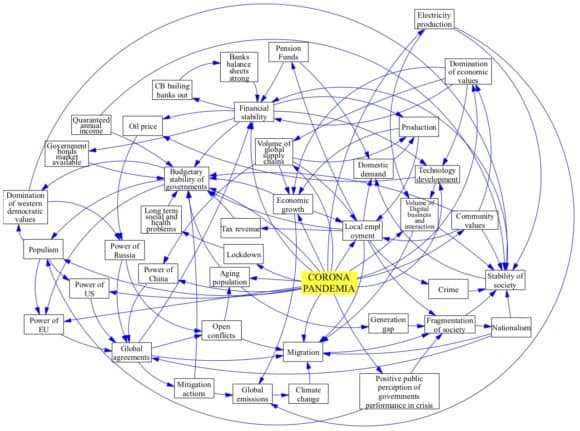By Leena Ilmola-Sheppard, senior researcher in the IIASA Advanced Systems Analysis Program.
Leena Ilmola-Sheppard discusses the value of employing novel research methods aimed at producing fast results to inform policies that address immediate problems like the current COVID-19 pandemic.
As researchers, the majority of our work – even if it is applied research – requires deep insight and plenty of reading and writing, which sometimes takes years. When we initiate a new method development project, for example, we never know if it will eventually prove to be useful in real life, except on very rare occasions when we are willing to step out of our academic comfort zones and explore if we are able to address the challenges that decision makers are faced with right now.
I would like to encourage my colleagues and our network to try and answer the call when decision makers ask for our help. It however requires courage to produce fast results with no time for peer review, to explore the limits of our knowledge and capabilities of our tools, and to run the risk of failure.
I share two examples with you in this blog. The first one describes a situation that played out years ago, while the second one is happening today.
When the first signs of a potential refugee crisis became visible late in 2014, the Finnish Prime Minister’s Office contacted the IIASA Advanced Systems Analysis Program (ASA) and asked whether we could produce an analysis for them. The ASA team had an idea to develop a new method for qualitative systems analysis based on an application of causal-loop-diagrams and we decided to test the approach with an expert team of 14 people from different Finnish ministries. I have to admit that the process was not exactly the best example of rigorous science, but it was able to produce results in only eight weeks.
“Experts that participated in the process from the government side accepted that the process was a pilot and exploratory in nature. In the end, the group was however able to develop a shared language for the different aspects of the refugee situation in Finland. The method produced comprised a shared understanding of the events and their interdependencies and we were able to assess the systemic impact of different policies, including unintended consequences. That was a lot in that situation,” said Sari Löytökorpi, Secretary General and Chief Specialist of the Finnish Prime Minister’s Office when reflecting on that experience recently.
The second case I want to describe here is the current coronavirus pandemic. The COVID-19 virus reached Finland at the end of January when a Chinese tourist was diagnosed. The first fatality in Finland was recorded on 20 March. This time, the challenge we are presented with is to look beyond the pandemic. The two research questions presented to us by the Prime Minister’s Office and the Ministry of Economic Affairs are: ‘How can the resilience of the national economy be enhanced in this situation?’ and secondly ‘What will the world look like after the pandemic?’
Pekka Lindroos, Director of Foresight and Policy Planning in the Finnish Ministry of Economic Affairs is confident, “We know that the pandemic will have a huge impact on the economy. The global outcome of current national policy measures is a major unknown and traditional economic analysis is not able to cover the dynamics of the numerous dimensions of the rupture. That is why we are exploring a combination of novel qualitative analysis and foresight methods with researchers in the IIASA ASA Program.”
I have been working on the implementation of the systems perspective to the coronavirus situation with a few close colleagues around the world who are experts in resilience and risk. We were able to deliver the first report on Friday, 27 March. Among other things, it emphasized the role of social capital and society’s resilience. A more detailed report is currently in production.

A simple systems map (causal loop diagram) representing a preliminary understanding of the world after COVID-19 from a one country perspective.
Note: This article gives the views of the author, and not the position of the Nexus blog, nor of the International Institute for Applied Systems Analysis.


You must be logged in to post a comment.